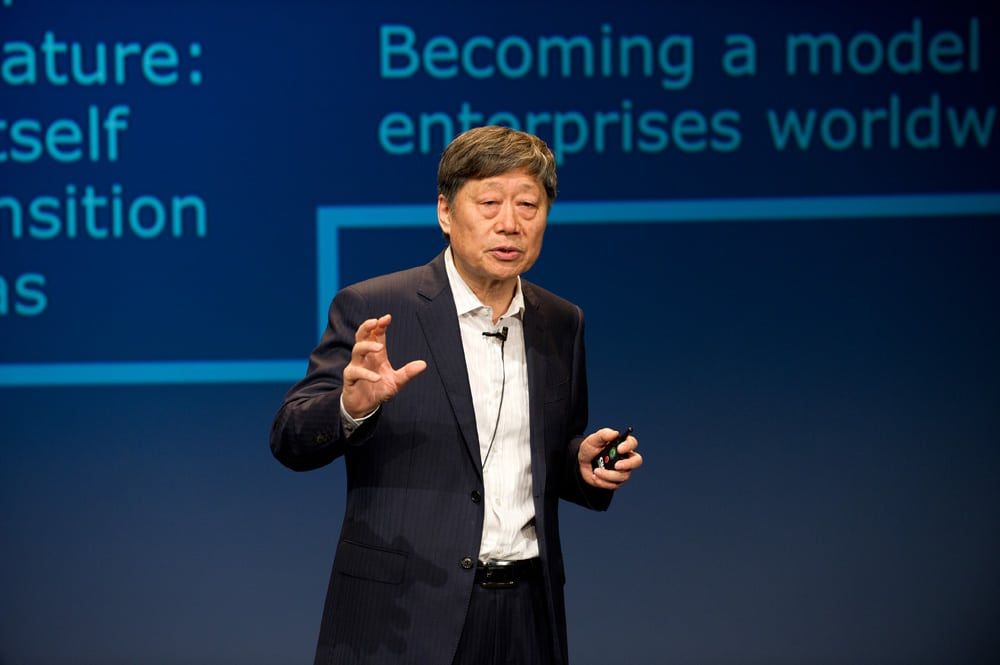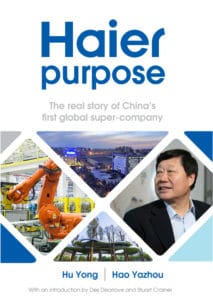

The Chinese company Haier’s belief is that everyone is a talent. The human resources process adopted the Chinese expression ‘looking at horses is not as good a method of judging them as racing them’, meaning that talent is not discerned by the leaders and managers, but emerges through fair, just and open competition.
In 1996, Haier CEO Zhang Ruimin felt that Haier was always working within too small a scope, and that the Group should develop a wider range of products. He also felt that the lack of talent constituted a deadly bottleneck on the way forward. The question of how to promote a good talent discovery system was very difficult to solve. Inspired by the eagerness to hire talented staff, Zhang Ruimin wrote an essay entitled ‘Haier is the Sea’.
Zhang Ruimin boiled Haier’s personnel philosophy down to four points: ‘First, enhancing a sense of fairness. Haier, through increased transparency, linked the way staff worked with their treatment, so as to give employees a sense of fairness. Second, giving employees a sense of accomplishment and respecting their achievements. Third, giving employees room for development. Leaders set the stage, allowing the staff to perform. Fourth, giving young cadres competitive opportunities.’
In 1995, a mid-level manager complained about the ‘poor quality of the staff’. Zhang Ruimin responded: ‘The quality of staff is the quality of leadership.’ He went on to say, ‘You are not responsible for the poor quality of your subordinates, but to improve the quality of your subordinates is your responsibility.’
Haier is good at finding weaknesses in management, that is, the weakest link in the chain. From the start, to address internal management level imbalances, Zhang Ruimin led Haier to select personnel from inside the company. It implemented an up and down promotion system, so that workers rotated and served in more than one position, allowing the talent of all the workers to grow.
‘The deeper the dolphin dives, the higher it leaps,’ goes the Chinese saying. This cycle ensured that the promoted workers were able to understand the most fundamental elements of the business. The deeper they sank, the higher they could rise, and the greater their achievement.
At Haier, an excellent employee could progress from a team leader to a workshop director, all the while working on the production system. But if he was to be promoted as a division leader, he would need marketing skills, so he had to begin with the most basic work in marketing departments, and then step by step move up from that position. Competent managers could go on to new posts; those that could not rise were removed.
This mechanism meant that when a worker applied to run higher-level departments Haier did not immediately allow them to take the post; instead, they were asked to undertake a basic training period. Some workers may have already reached a very high position, but if they lacked the experience for the new job, they would be sent to a more junior position. If they had experience in some aspects of the role, but had low overall ability, they were also sent for training. The pressure on the staff was high, but this helped to cultivate the overall ability of the workers.
As Haier’s workers work their way up through the system, the result is that the current top managers were all once young employees who have grown along with the company, standing out among the competition, and striving to become senior leaders. Supervision at Haier has always been rather strict. From the company to the various functional divisions, from each business unit to the factories, each worker has an evaluation form, divided into praise and criticism columns. Workers who receive praise are given additional points (salary) and those who receive criticism have their points reduced (fines). After years of operation, the praise and criticism system now forms part of Haier’s infrastructure. It is common for senior leaders to be criticized; what they work hardest to avoid is being criticized in the inhouse publication Haier People.
Says Zhang Ruimin:
Haier’s internal structure changes constantly, but there is little changeover in personnel. This may be caused by the culture of Haier. When we had just started business, every month there was a criticism and praise session targeted at the company’s workers. They got psychologically used to it. They got used to the ups and downs, and eventually they felt it was normal. Many SOEs came to us to see how we operated, and learned this from us. It cannot be done in one or two days; it requires long-term effort.
Second, we had strong requirements from the very beginning that everything had to be transparent. No cliques were allowed to form, and no one was permitted to work with small circles of friends at the expense of the wider company.
I think that fairness is very important. I was from a poor background, had served as a worker, and I worked at the grassroots level for many years. As someone who was subject to management from higher-ups, at that time, the thing I longed for most was simple: fairness. If we had a fair environment, I would work very hard, and I believe everyone else would do the same thing. When I served as a manager, I tried to build and promote a fair corporate culture, so within Haier we worked hard to create transparent relationships.
 In a two-year period, 2,000 students joined the company. This is a huge number of new recruits. Each student had his or her own career development plan. Whatever level they wanted to reach, I would design a road for them, so that if they worked hard, they could rise to the position they wanted to reach. Of course, this was connected with performance. Promotion is always based on ability. Every month we held a meeting for high-level managers, and every month, we evaluated the results of their monthly innovations.
In a two-year period, 2,000 students joined the company. This is a huge number of new recruits. Each student had his or her own career development plan. Whatever level they wanted to reach, I would design a road for them, so that if they worked hard, they could rise to the position they wanted to reach. Of course, this was connected with performance. Promotion is always based on ability. Every month we held a meeting for high-level managers, and every month, we evaluated the results of their monthly innovations.
This is an edited extract from Haier Purpose by Hu Yong and Hao Yazhou now available from Thinkers50 and Infinite ideas.

Thinkers50 Limited
The Studio
Highfield Lane
Wargrave RG10 8PZ
United Kingdom

Thinkers50 Limited
The Studio
Highfield Lane
Wargrave RG10 8PZ
United Kingdom

| Cookie | Duration | Description |
|---|---|---|
| LANG | 9 hours | Linkedin set this cookie to set user's preferred language. |
| nsid | session | This cookie is set by the provider PayPal to enable the PayPal payment service in the website. |
| sp_landing | 1 day | The sp_landing is set by Spotify to implement audio content from Spotify on the website and also registers information on user interaction related to the audio content. |
| sp_t | 1 year | The sp_t cookie is set by Spotify to implement audio content from Spotify on the website and also registers information on user interaction related to the audio content. |
| tsrce | 3 days | PayPal sets this cookie to enable the PayPal payment service in the website. |
| x-pp-s | session | PayPal sets this cookie to process payments on the site. |
| __cf_bm | 30 minutes | This cookie, set by Cloudflare, is used to support Cloudflare Bot Management. |
| Cookie | Duration | Description |
|---|---|---|
| l7_az | 30 minutes | This cookie is necessary for the PayPal login-function on the website. |
| Cookie | Duration | Description |
|---|---|---|
| CONSENT | 2 years | YouTube sets this cookie via embedded youtube-videos and registers anonymous statistical data. |
| _ga | 2 years | The _ga cookie, installed by Google Analytics, calculates visitor, session and campaign data and also keeps track of site usage for the site's analytics report. The cookie stores information anonymously and assigns a randomly generated number to recognize unique visitors. |
| _gat_gtag_UA_10408481_1 | 1 minute | Set by Google to distinguish users. |
| _ga_ZP8HQ8RZXS | 2 years | This cookie is installed by Google Analytics. |
| _gid | 1 day | Installed by Google Analytics, _gid cookie stores information on how visitors use a website, while also creating an analytics report of the website's performance. Some of the data that are collected include the number of visitors, their source, and the pages they visit anonymously. |
| Cookie | Duration | Description |
|---|---|---|
| NID | 6 months | NID cookie, set by Google, is used for advertising purposes; to limit the number of times the user sees an ad, to mute unwanted ads, and to measure the effectiveness of ads. |
| test_cookie | 15 minutes | The test_cookie is set by doubleclick.net and is used to determine if the user's browser supports cookies. |
| VISITOR_INFO1_LIVE | 5 months 27 days | A cookie set by YouTube to measure bandwidth that determines whether the user gets the new or old player interface. |
| YSC | session | YSC cookie is set by Youtube and is used to track the views of embedded videos on Youtube pages. |
| yt-remote-connected-devices | never | YouTube sets this cookie to store the video preferences of the user using embedded YouTube video. |
| yt-remote-device-id | never | YouTube sets this cookie to store the video preferences of the user using embedded YouTube video. |
| yt.innertube::nextId | never | This cookie, set by YouTube, registers a unique ID to store data on what videos from YouTube the user has seen. |
| yt.innertube::requests | never | This cookie, set by YouTube, registers a unique ID to store data on what videos from YouTube the user has seen. |
| Cookie | Duration | Description |
|---|---|---|
| DEVICE_INFO | 5 months 27 days | No description |
| loglevel | never | No description available. |
| m | 2 years | No description available. |
Thinkers50 Limited has updated its Privacy Policy on 28 March 2024 with several amendments and additions to the previous version, to fully incorporate to the text information required by current applicable date protection regulation. Processing of the personal data of Thinkers50’s customers, potential customers and other stakeholders has not been changed essentially, but the texts have been clarified and amended to give more detailed information of the processing activities.